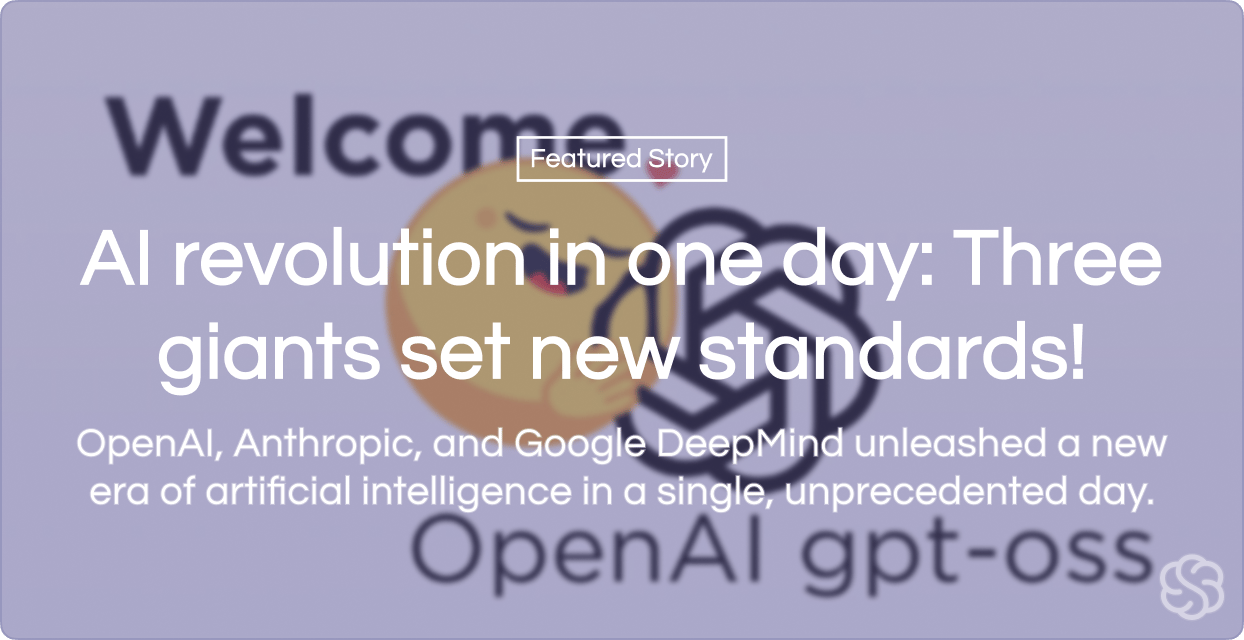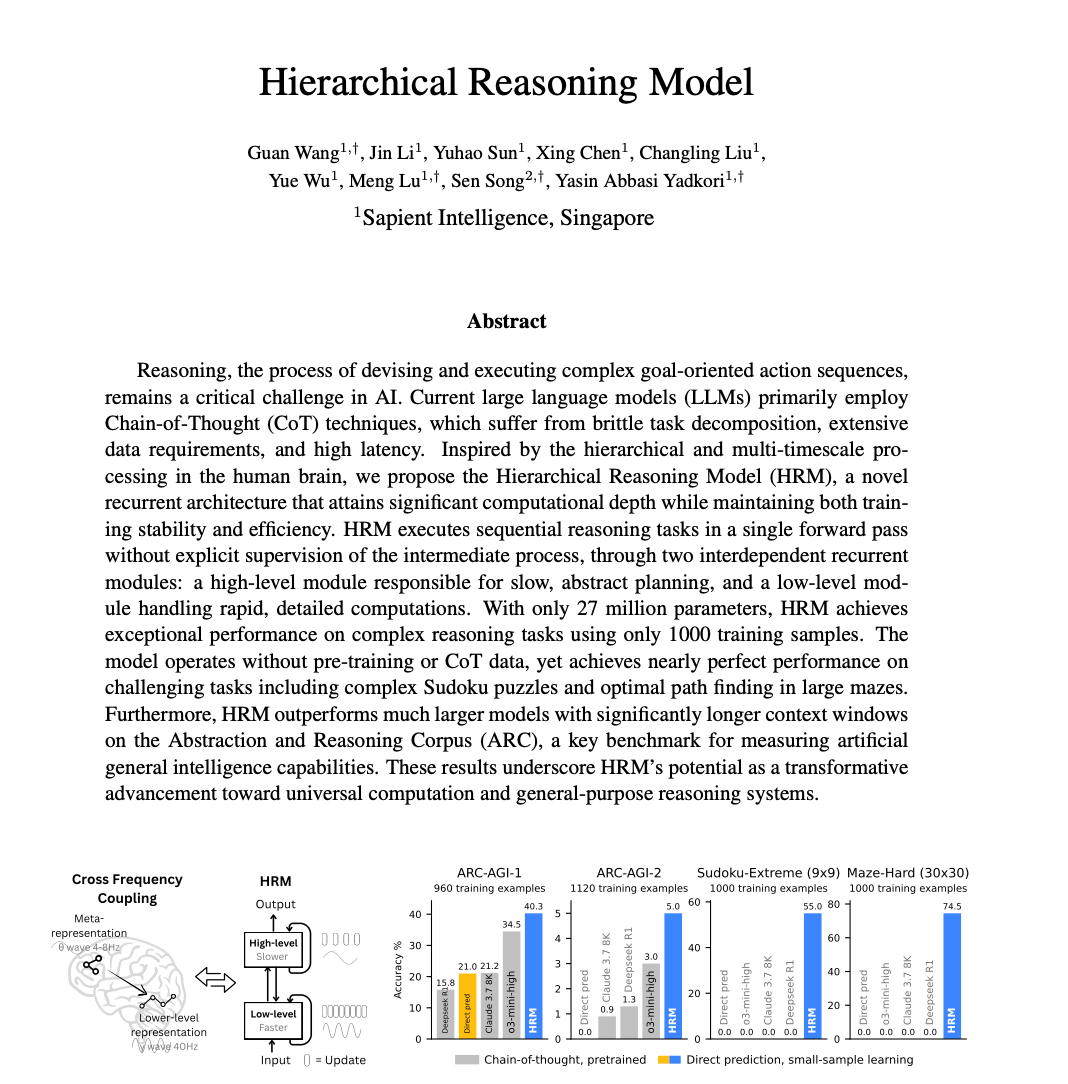In partnership with
Dear Readers,
Anyone who thought yesterday that the AI world was already running at full speed was proven wrong today. Three tech giants rewrote the rules of the game within 24 hours: OpenAI reopened the doors to freely available, powerful models with GPT OSS, Anthropic delivered the most accurate upgrade for AI coding to date with Claude Opus 4.1, and Google DeepMind brought interactive 3D worlds directly from text commands to the screen for the first time with Genie 3. It's a day that feels like a glimpse into the future – except that the future is already here.
In this issue, we guide you through this technological turning point: from open models that are suddenly making start-ups competitive, to AI systems that develop complex software almost autonomously, to digital holodecks that are revolutionizing research and gaming alike. We also show you new breakthroughs in mathematics, biomedicine, and hierarchical thinking—examples of how quickly AI is solving real-world problems. Read on and discover how these developments are changing our everyday lives, our work, and perhaps even our perception of reality.
In Today’s Issue:
Three AI giants just changed the entire landscape in a single day
Google's Gemini can now turn your ideas into a personalized, illustrated storybook
A new AI lets you generate and edit your own high-quality, multilingual songs
And more AI goodness…
All the best,

AI revolution in one day: Three giants set new standards!
The Takeaway
👉 OpenAI democratizes AI reasoning: With GPT OSS, open-weight models are available again for the first time since 2019, which companies can use commercially without license fees.
👉 Anthropic sets new coding standards: Claude Opus 4.1 achieves 74.5% accuracy in software engineering tasks and is ready to use in GitHub Copilot
👉 Google creates the digital holodeck: Genie 3 generates interactive 3D worlds from text prompts in real time for the first time – a milestone for AI agent training and simulation.
👉 Strategic timing coincidence: The coordinated release date points to intense competition ahead of the GPT-5 launch and accelerates AI innovation overall.
August 5, 2025, will go down as a turning point in AI history – never before have OpenAI, Anthropic, and Google DeepMind released such groundbreaking releases on a single day!
OpenAI surprises with GPT OSS (120B and 20B parameters) – the first open-weight models since GPT-2 from 2019, available under the Apache 2.0 license. These mixture-of-experts models with 4-bit quantization enable lightning-fast inference with minimal resource consumption – the large model runs on a single H100 GPU, the smaller one even on 16GB consumer hardware!

At the same time, Anthropic is launching Claude Opus 4.1 as a drop-in replacement for Opus 4 with improved software engineering accuracy of 74.5% on SWE-bench. The model is already available in GitHub Copilot and supports advanced thinking processes with tool integration.

Google DeepMind tops it all off with Genie 3 – a world model that generates interactive 3D environments in real time from simple text prompts. Users can enter their own worlds at 24 FPS and 720p resolution and experiment with AI agents – a real step towards the digital holodeck!

Just imagine: developers can now experiment with open-source reasoning models while the most advanced coding AI and interactive world generation become available in parallel. What revolutionary applications will emerge from this unique constellation?
Why it matters: This coordinated release of three breakthrough technologies in one day marks a paradigm shift in the AI landscape while democratizing access to high-performance AI tools. The combination of open-source reasoning, improved code generation, and interactive world models opens up entirely new possibilities for developers and researchers worldwide.
Sources:
🔗 Anthropic: https://www.anthropic.com/news/claude-opus-4-1
🔗 TechCrunch OpenAI: https://techcrunch.com/2025/08/05/openai-launches-two-open-ai-reasoning-models/
🔗 Hugging Face GPT OSS: https://huggingface.co/blog/welcome-openai-gpt-oss
🔗 GitHub Blog Claude: https://github.blog/changelog/2025-08-05-anthropic-claude-opus-4-1-is-now-in-public-preview-in-github-copilot/
🔗 Simon Willison: https://simonwillison.net/2025/Aug/5/claude-opus-41/
Ad
Love Hacker News but don’t have the time to read it every day? Try TLDR’s free daily newsletter.
TLDR covers the best tech, startup, and coding stories in a quick email that takes 5 minutes to read.
No politics, sports, or weather (we promise). And it's read by over 1,250,000 people!
Subscribe for free now and you'll get our next newsletter tomorrow morning.
In The News
ElevenLabs Launches AI Music Generator
ElevenLabs has launched Eleven Music, a new high-quality AI model that gives users complete, multilingual control to generate and edit songs, including individual sections and lyrics.
Gemini Launches AI Storybook
Google has launched a new free "Storybook" feature in the Gemini app that allows anyone to create personalized, illustrated stories with read-aloud narration.
Graph of the Day
The current rankings:
#1: o3-search
#2 (tie): Gemini-2.5, Claude-Opus-4, Perplexity-Sonar-Pro
#4": Perplexity-Sonar-Reasoning-Pro
#5: (tie) Grok-4, GPT-4o

Seed-Prover: Deep and Broad Reasoning for Automated Therorem Proving
Researchers at ByteDance have developed Seed Prover, an AI for automatically proving mathematical theorems. The new feature is the “lemma style”: the AI breaks down complex problems into smaller, verifiable steps (lemmas) and refines them iteratively instead of proving the entire theorem at once. The method is so powerful that it solved 5 out of 6 problems in the 2025 International Mathematical Olympiad. This is a breakthrough that makes AI a reliable tool for mathematical research.
Hierarchical Reasoning Model
Researchers have developed a brain-inspired AI system called HRM that thinks hierarchically: a slow layer plans abstractly, while a fast layer solves details. What's new is that it solves complex logic tasks such as Sudoku internally and without linguistic thought processes – and it does so with only 1,000 training examples. This is relevant because it excels where huge language models fail. For the future, this approach promises a more efficient, robust AI that actually solves problems algorithmically.
CELLFORGE
Researchers have developed CELLFORGE, an AI system in which specialized AI agents work together as a team to design virtual cell models. What is new is the fully automated process: the agents analyze data, debate the best strategy, and program a customized solution. This is relevant because it accurately predicts how cells will respond to drugs or genetic modifications. In the future, this approach promises to fundamentally accelerate drug discovery and personalized medicine by automating complex research processes.

Get Your AI Research Seen by 200,000+ People
Have groundbreaking AI research? We’re inviting researchers to submit their work to be featured in Superintelligence, the leading AI newsletter with 200k+ readers. If you’ve published a relevant paper on arXiv.org, email the link to [email protected] with the subject line “Research Submission”. If selected, we will contact you for a potential feature.
Question of the Day
Tweet of the Day
xAI is open sourcing Grok 2!
Ad
Turn AI Into Your Income Stream
The AI economy is booming, and smart entrepreneurs are already profiting. Subscribe to Mindstream and get instant access to 200+ proven strategies to monetize AI tools like ChatGPT, Midjourney, and more. From content creation to automation services, discover actionable ways to build your AI-powered income. No coding required, just practical strategies that work.
Rumours, Leaks, and Dustups
Claude Opus 4.1 has about 2% better evals in the SWE benchmark.
Moreover, it is already available. But pay even more attention to the comment afterwards:
In the next few weeks (!) much bigger improvements will be released for their models.
Some hints about OpenAIs upcoming device










